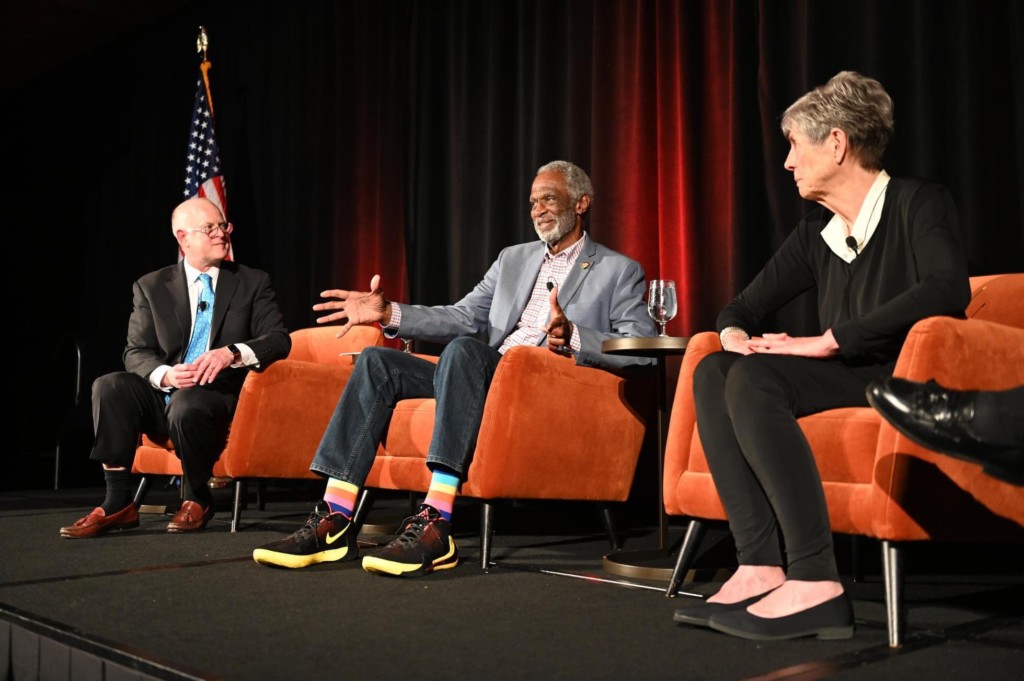
From left, former Wisconsin House Speaker Scott Jensen, education choice pioneer Howard Fuller, and School Choice Wisconsin founder Susan Mitchell share the stage at a session during the American Federation for Children National Policy Summit Sept. 29-30 in Milwaukee.
Editor’s note: The American Federation for Children held its national policy summit Sept. 29-30, welcoming key figures in the education choice movement as well as policymakers intent on expanding education opportunities for families. AFC communications specialist, former Florida Tax Credit Scholarship recipient and reimaginED guest blogger Nathan Cunneen was there and shares his observations in this post.
MILWAUKEE – The future of the school choice movement must include the beneficiaries of school choice themselves. This is the core belief behind the American Federation for Children’s Future Leaders Fellowship Program, which helps school choice beneficiaries who have reached college age combine their powerful stories with political advocacy training to help them grow into powerful voices for school choice.
Fellows of the leadership program had the opportunity this past week to address the conference through a panel titled, “The Future of School Choice Advocacy.” It was our intent to share how school choice affected our lives and to offer a hopeful roadmap for further progress.
We explained how even the most eloquently presented education choice myths fall apart quickly when confronted with honest testimony from a confident, well-spoken young person who attributes part of his or her success to school choice.
Those who oppose education freedom do everything they can to keep the discourse focused on abstract principles like school funding, democracy, or “health and safety.” The Future Leaders Fellows make that impossible.
Gissell Vera, for example, explained how she came to the United State from Mexico in search of more life options through education. In her small village growing up, she was expected to do exactly what her mother had done – grow up, marry a fisherman and become a housewife.
Gissell knew she had so much more inside of her. She came to the United States, used the Milwaukee Parental Choice Program to obtain access to a private school, graduated as her high school’s valedictorian, and earned full-ride scholarships to Marquette and Georgetown. As Gissell explained to our crowd, none of this would have been possible without school choice.
Next, we discussed the rising importance of school choice in political campaigns.
Hera Varmah, from Florida, explained how she sees school choice as an up-and-coming tentpole voting topic.
“This is going to be a bigger and bigger issue,” she said. “I went to Florida A&M University, and everyone thought that Andrew Gillum was going to be governor a few years ago. But Ron DeSantis won, and the Wall Street Journal credits school choice moms as the reason. Politicians need to know that voters care about school choice.”
Lastly, we wanted to be sure to tie our panel into the overall theme of this year’s Summit.
The event celebrated 30 years of the Milwaukee Parental Choice Program, and the opening dinner was a dedication to the innovative and reform-minded leaders who helped create the nation’s first school choice program decades ago. Former Wisconsin House Speaker Scott Jensen, as well as education choice pioneer Howard Fuller, School Choice Wisconsin founder Susan Mitchell, and former Wisconsin Gov. Tommy Thompson regaled the crowd with stories from their perspective and detailed the political challenges of passing such a program.
Unbeknownst to our honorees, four Future Leaders Fellows who directly benefitted from the program were in the audience.
This was something we desperately wanted to incorporate into our panel. Our moderator, Walter Banks Jr., masterfully navigated the conversation toward this topic. He explained how this year’s legislative wins will directly affect more students like us. Then he asked some questions: After such an amazing year of school choice victories, can we still be hopeful for the future? What role do the Fellows have to play in that? Why are they so important?
He illuminated. AFC’s Future Leaders Fellowship program trains and empowers those who have benefited from school choice in the past so that they can advocate for it in the future. How fitting, I thought, that in Milwaukee, as we celebrate three decades of school choice champions, the next generation of advocates is sitting right here.
I took my chance to build on that:
“We’re so honored to be a part of this movement, which so powerfully stands up for families and started right here in Milwaukee. I think I speak for all our Fellows and for AFC staff when I say that our honorees last night started this movement, but we want to be a part of the group that finishes it. We want to be a part of the generation that completes this mission by finally giving all families the freedom to choose the best education for their student.”
This is a foundational component of our fellowship, and the root of out panel.
If it’s possible that a school choice beneficiary can grow up to become a school choice advocate, then we want these young people to know that what is possible is only limited by what they believe to be possible. With the power of our personal stories and strong support from the seasoned advocates in this space, we believe that universal school choice in America is something achievable in our lifetimes.
We want that vison to personify the “future” of school choice in America. We said so on stage.